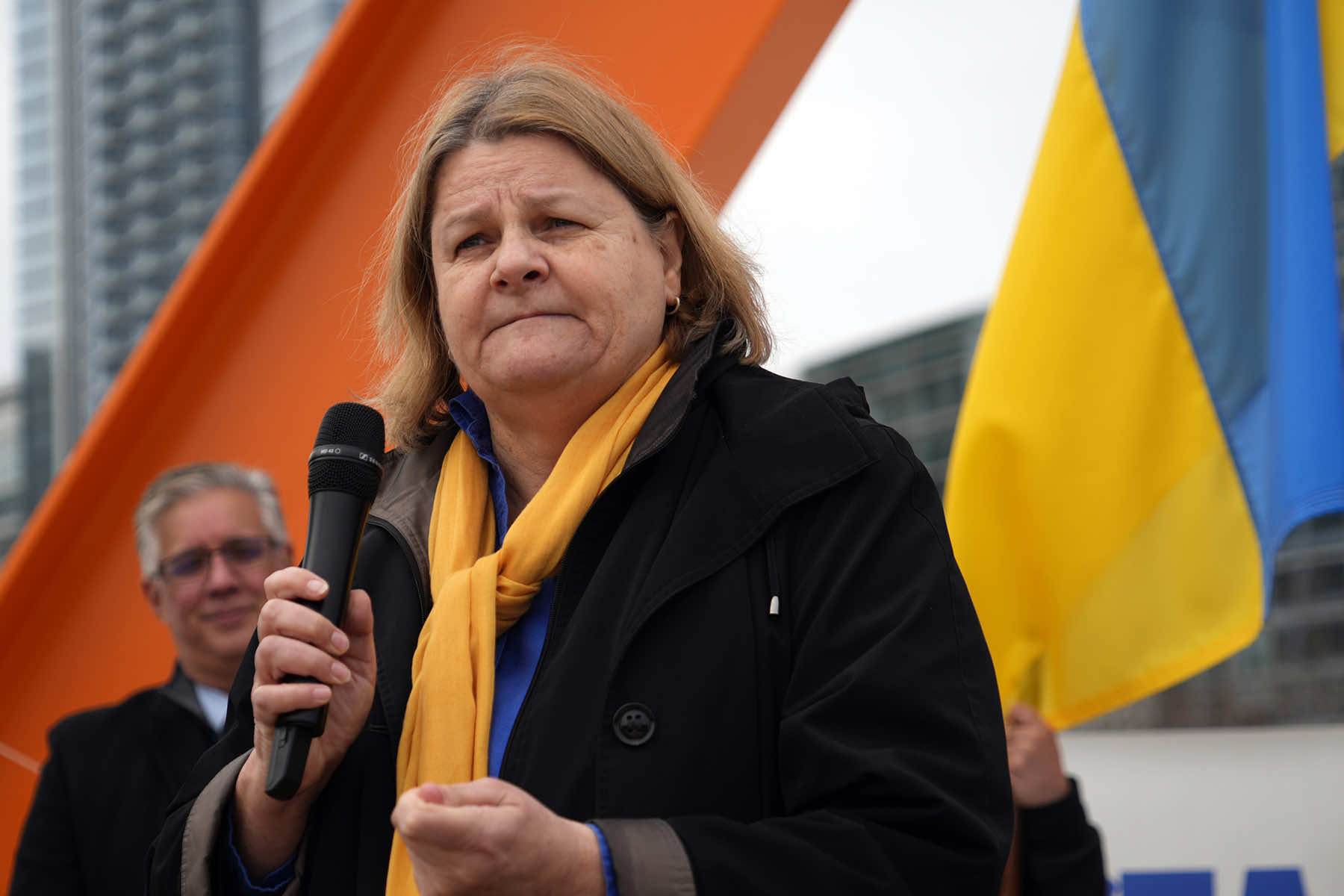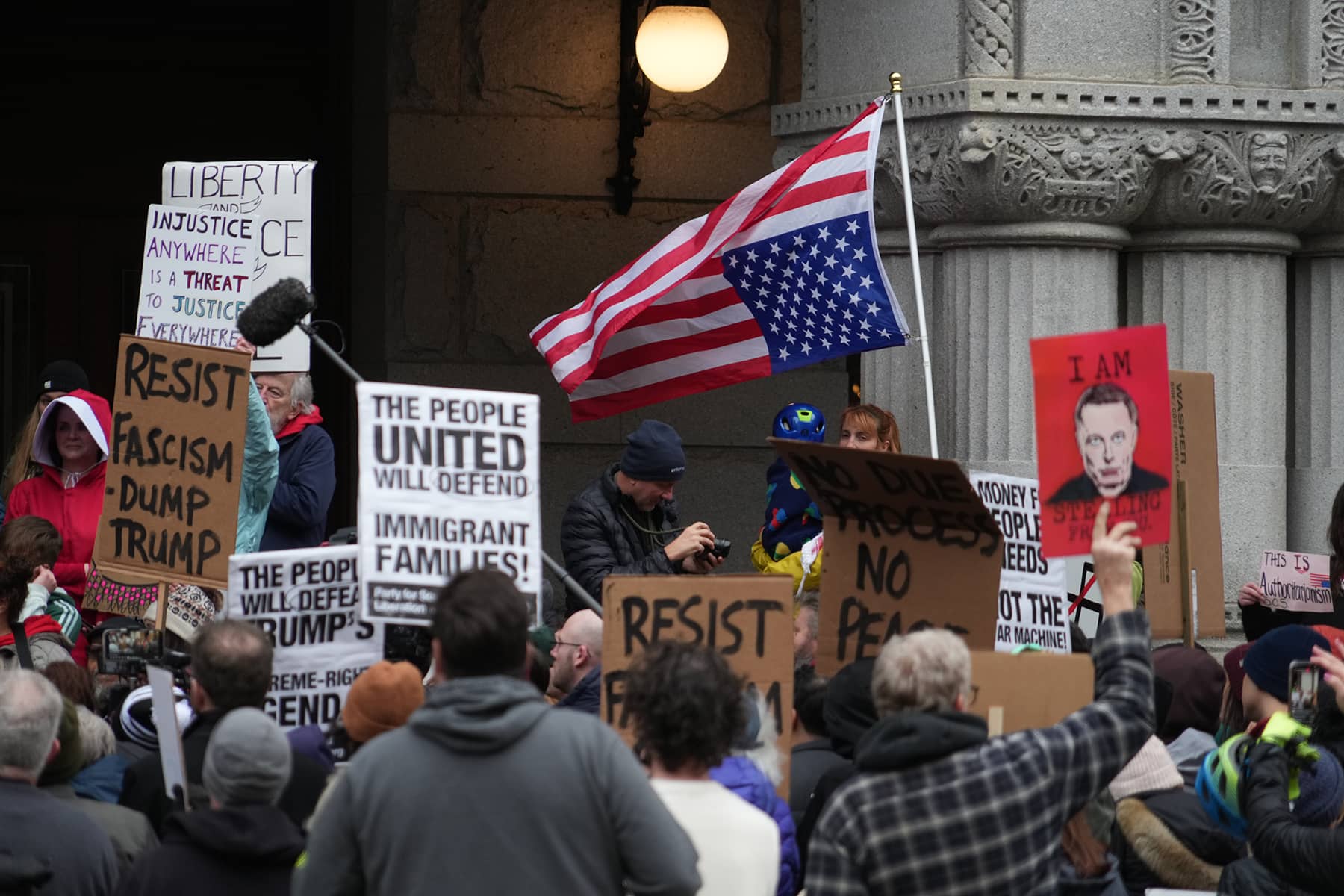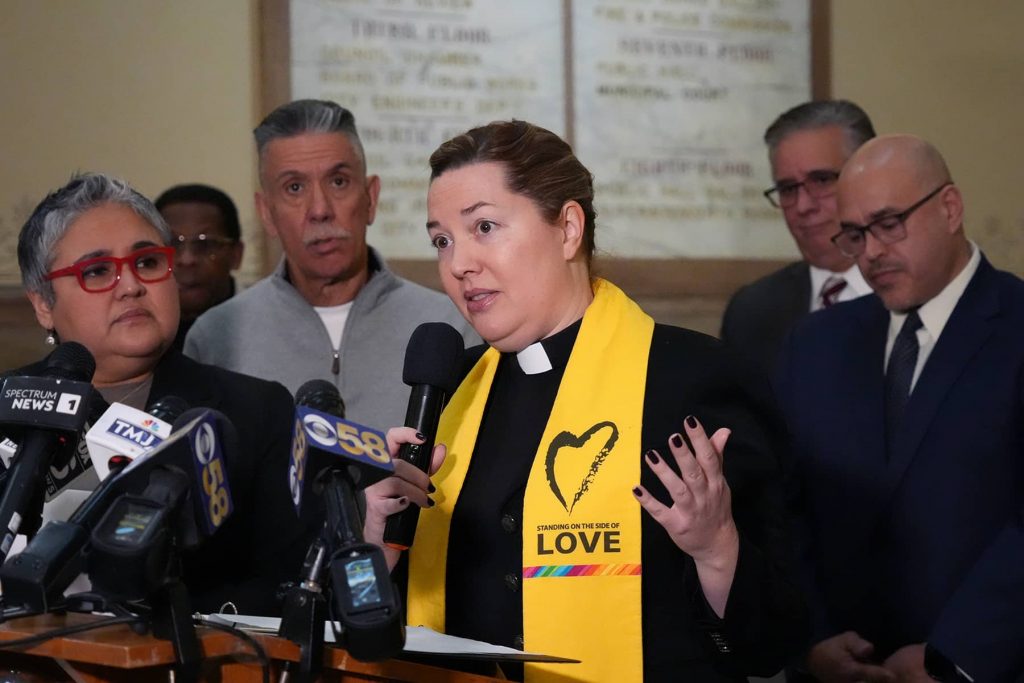
The FBI’s questionable arrest of Milwaukee County Circuit Court Judge Hannah Dugan represents a serious escalation in the Trump regime’s politicization of law enforcement.
Cloaked under the appearance of a criminal complaint, this action reveals a broader strategy: to intimidate local officials who do not unconditionally support the regime’s controversial immigration enforcement efforts.
The charges against Judge Dugan stem from an encounter on April 18, when federal agents attempted to arrest a defendant, Eduardo Flores-Ruiz, outside her courtroom. Crucially, the agents did not possess a judicial warrant, only an “administrative warrant” issued by the Immigration and Customs Enforcement (ICE).
An administrative warrant does not carry the authority of a court order and does not mandate any cooperation from judges or local law enforcement. It is an internal document, insufficient to compel any legal obligation under the Constitution.
Judge Dugan, faced with ICE agents waiting in the courthouse hallway, took steps consistent with protecting the sanctity of her courtroom proceedings. She directed federal agents to escalate their concerns to the Chief Judge and ensured that the defendant’s hearing was not disrupted by outside interference
According to the FBI’s own affidavit, she later instructed the defendant and his attorney to leave through a secured doorway, an action now being portrayed as criminal conduct.
This framing is not just misleading. It is dangerous.
It seeks to redefine the basic duties of a judge, which are preserving courtroom order, safeguarding constitutional rights, and ensuring a fair process, as obstruction.
By arresting a sitting judge over routine courthouse management, the Trump regime has signaled its eagerness to weaponize federal power against members of the judiciary who do not align with its political agenda.
“This Administration’s willingness to weaponize federal law enforcement is shocking, and this arrest has all the hallmarks of overreach.” – U.S. Representative Gwen S. Moore (D-WI)
“It is remarkable that the Administration would dare to start arresting state court judges. It’s a whole new descent into government chaos.” – U.S. Representative Jamie Raskin (D-MD), ranking member of the House Judiciary Committee
“The Trump administration again is breaking norms in how it’s dealing with immigration, the legal system, and normalcy. … This is stuff I expect from Third World countries.” – U.S. Representative Mark Pocan (D-WI)
“They arrested a judge?! They can no longer claim to be a party of law and order. This will have to be a red line for congressional Republicans. Unbelievable.” – U.S. Representative Greg Landsman (D-OH)
“This is a gross overreach designed to disrupt the function of our courts and legal system, and intentionally create fear in those who would demand that the rule of law is upheld and our constitution followed.” – Emilio De Torres, Executive Director of Milwaukee Turners
“Let’s be clear. Trump’s arrest of Judge Dugan in Milwaukee has nothing to do with immigration. It has everything to do with his moving this country toward authoritarianism. He is illegally usurping Congressional powers. He is suing media that he dislikes. He is attacking universities whose policies he disagrees with. He is intimidating major law firms who have opposed him. He is ignoring a 9-0 Supreme Court decision to bring Kilmar Abrego Garcia back from El Salvador, where he was illegally sent. He is threatening to impeach judges who rule against him.” – U.S. Senator Bernie Sanders
The broader context cannot be ignored. Donald Trump has spent his presidency attacking judges who rule against him, disparaging courts that enforce constitutional checks, and pushing narratives that cast independent jurists as adversaries. The arrest of Judge Dugan fits neatly into this pattern: an attempt to suppress judicial independence by setting a public example.
It is also no coincidence that the charges themselves mirror an earlier case from Trump’s first term, the attempted prosecution of Massachusetts Judge Shelley Joseph. That case collapsed under scrutiny, abandoned by the Department of Justice once it became clear that the underlying actions were legally defensible and politically targeted.
The parallels are unmistakable: administrative warrants treated as judicial mandates, judges treated as criminals for managing their courtrooms according to established practice.
FBI Director Kash Patel publicly posted the following statement on X as Judge Dugan was being arrested. This public communication by the FBI’s top official raises serious questions about the politicization of federal law enforcement and the abandonment of long-established norms of neutrality, discretion, and due process.
“Just NOW, the FBI arrested Judge Hannah Dugan out of Milwaukee, Wisconsin on charges of obstruction — after evidence of Judge Dugan obstructing an immigration arrest operation last week. We believe Judge Dugan intentionally misdirected federal agents away from the subject to be arrested in her courthouse, Eduardo Flores Ruiz, allowing the subject — an illegal alien — to evade arrest. Thankfully, our agents chased down the perp on foot and he’s been in custody since, but the Judge’s obstruction created increased danger to the public. We will have more to share soon. Excellent work.” – FBI Director Kash Patel
The FBI Director’s post is a profound violation of professional and legal standards expected from the nation’s highest federal law enforcement officer. Announcing an arrest, particularly of a sitting judge, in a celebratory tone on a public social media platform undermines the appearance of judicial impartiality, disregards the presumption of innocence, and threatens the integrity of any future proceedings.
Patel’s language, by referring to the defendant as having “obstructed” and labeling the immigration subject as a “perp,” effectively pronounces guilt before any trial has occurred. It is an extrajudicial commentary that could severely prejudice the case, violate due process rights, and compromise public confidence in the fairness of the judicial system.
In addition, the director’s framing of the arrest as a moment of “excellent work” by agents transforms a serious constitutional event into a public relations stunt. Law enforcement agencies are bound by longstanding norms that prohibit public officials from making statements that could influence ongoing legal matters. The purpose of these standards is to protect the integrity of the court system, not to advance political narratives or score points in the media.
In this case, the FBI’s own leadership has abandoned that responsibility, signaling to the nation that under Trump’s rule, federal law enforcement is not only a tool of political power but one that is willing to shred the appearance of fairness, accountability, and rule of law to do so.
Although federal law permits prosecutors to bring initial felony charges through a criminal complaint without a grand jury indictment, the choice to use that shortcut against a sitting judge is also deeply irregular.
Under standard practice, and out of respect for judicial independence, felony charges against a member of the judiciary are typically presented to a grand jury first, ensuring public legitimacy and procedural integrity.
The fact that prosecutors bypassed this safeguard to arrest Judge Dugan, just in time to dominate the morning media cycle on rightwing outlets like FOX News, also reveals the political priorities behind the case.
It was not about the careful administration of justice. It was about manufacturing a headline for Trump’s media allies.
According to the FBI’s criminal complaint, it acknowledges that Flores-Ruiz was ultimately arrested outside the courthouse after a brief pursuit. There was no permanent evasion of justice. There was no loss of custody stemming from any concealment or harboring effort by Judge Dugan.
What occurred was the exercise of judicial discretion in managing the proceedings of her court, discretion that federal agents and Trump’s prosecutors have now chosen to criminalize.
Most importantly, the context of the administrative warrant itself cannot be overlooked. Administrative warrants do not allow for forced entry. They do not authorize detention without judicial review.
They exist only within a narrow bureaucratic framework that does not override constitutional protections. The expectation that Judge Dugan should have treated an administrative warrant as binding authority is a fundamental misstatement of law, and one that speaks more to political priorities than to any real violation of federal statutes.
Through her legal representation, Judge Dugan released this statement on April 25:
“Judge Hannah C. Dugan has committed herself to the rule of law and the principles of due process for her entire career as a lawyer and a judge. She has retained former United States Attorney Steven Biskupic to represent her. Judge Dugan will defend herself vigorously, and looks forward to being exonerated. This will be the extent of any statements or interviews at this time.”
Throughout her judicial career, Judge Dugan consistently championed the advancement of women within the legal system. Her public service reflected a commitment to ensuring that leadership in the judiciary and legislative branches was not only more representative but also more inclusive of the voices and experiences of women.
From her early work with Legal Action of Wisconsin to her role on the Milwaukee County Circuit Court, Judge Dugan demonstrated a belief that equitable justice required the active participation of strong female leaders at every level of governance.
At a rally on February 24, marking the 3rd year of Russia’s full-scale invasion of Ukraine, Judge Dugan recounted the time she spent in Ukraine years ago, when she joined a team from Wisconsin to share insights on constitutional law and America’s democratic processes. She emphasized how eager Ukrainians were to build a freer society with a deep-rooted desire for liberty.
“All of these post-USSR republics were hungry for democracy and freedom. Three years ago, when the full-scale invasion started, we saw their commitment. We continue to see their commitment to freedom, to liberty, to self-determination, to the rule of law. I urge you to continue to fight with Ukrainians and offer support however you are able. I also just want to say that all of us who went there from Wisconsin – we went with the support of USAID to help build democracy around the world.” – Judge Hannah Dugan
She also frequently recognized the trailblazing contributions of women who had shaped Wisconsin’s judiciary. Among those she deeply admired was Justice Shirley Abrahamson, the first woman to serve on the Wisconsin Supreme Court and one of the most influential jurists in state history. Judge Dugan often cited Justice Abrahamson’s career as a standard of judicial excellence, independence, and courage. They were qualities she herself sought to uphold on the bench.
Her reverence for leaders like Justice Abrahamson underscored a broader philosophy: that the judiciary should reflect the diversity, strength, and intellect of the communities it serves. Beyond the courts, Judge Dugan also celebrated the impact of women legislators who had broken barriers in Wisconsin politics.
She viewed legislative leadership as inseparable from the health of the judiciary, believing that public trust in democratic institutions depended on visible, principled leadership across all branches of government.
Whether mentoring young attorneys, speaking at civic events, or presiding from the bench, Judge Dugan made clear that progress in the legal profession required lifting up the next generation of women to ensure that the ideals of justice and equality continued to expand.
Judge Dugan’s legal situation fits into a broader pattern that has defined Trump’s political career: the systematic targeting and denigration of strong, independent women who refuse to submit to his authority.
From judges and prosecutors to legislators and journalists, women who assert themselves against Trump’s political agenda have repeatedly found themselves vilified, smeared, or subjected to government retaliation.
Dugan’s lifelong advocacy for judicial integrity, democratic values, and the advancement of women made her a natural adversary to a regime that views independent female leadership as a threat. Her arrest is not simply an attack on one judge, it is another chapter in a long campaign of punishing women who stand between Trump and unchecked power.
Republican officials have been quick to frame the arrest as a victory for “law and order,” while continuing to excuse or ignore the Trump regime’s own daily assaults on legal norms and public accountability.
The hypocrisy is glaring: a system that turns a procedural disagreement into a federal offense, while allowing open defiance of court orders and the manipulation of law enforcement for political purposes to go unchecked.
Wisconsin Republican lawmakers are already expressing their fake outrage and threatening to remove Judge Dugan from the bench. As State Representative Tyler August (R-Walworth) said:
“These charges are serious, deeply troubling, and strike at the core of public trust. We will continue to monitor the legal process, but Assembly Republicans stand prepared to act decisively if these serious allegations are confirmed. Accountability is not optional — it is essential to the integrity of public service.”
Representative August and other MAGA politicians are not worried about law and order. They do not care about accountability. They use the law only to attack their enemies, and then remain silent to protect the criminality of their political masters. Otherwise, they would have demanded answers to any one of these issues:
ALLEGED MISCONDUCT BY PRESIDENT TRUMP AND HIS REGIME
• Defiance of a Supreme Court order directing the government to facilitate the return of Kilmar Abrego Garcia, a Maryland resident wrongfully deported to El Salvador.
• Public misrepresentation by White House officials, falsely labeling Abrego Garcia as an MS-13 member without evidence.
• Proposal to deport American citizens convicted of crimes to foreign countries, raising constitutional violations.
• Issuance of pardons to individuals convicted for their roles in the January 6 Capitol riot, undermining judicial accountability.
• Directing the Department of Justice to investigate and target former government officials who criticized President Trump.
• Revocation of security clearances from political opponents and former officials without standard procedural review.
ALLEGED MISCONDUCT BY DOGE (ELON MUSK’S “DEPARTMENT OF GOVERNMENT EFFICIENCY”)
• Unauthorized access to classified federal information without appropriate security clearances.
• Deployment of AI-driven surveillance systems to monitor federal employees’ political views and private activities.
• Fabrication and exaggeration of financial savings claimed by the agency to justify its operations.
• Involvement of Elon Musk in potential conflicts of interest by blending government influence with his private business ventures.
• Exercise of quasi-official authority by Musk and DOGE despite lacking formal congressional authorization or oversight.
ALLEGED MISCONDUCT BY TRUMP’S WHITE HOUSE CABINET MEMBERS
• Multiple credible allegations of sexual harassment and assault against cabinet nominees and sitting cabinet members.
• Active participation by cabinet officials in obstructing compliance with federal court orders concerning immigration enforcement.
• Politicization of traditionally independent federal agencies to pursue personal and political vendettas.
• Systematic undermining of constitutional rights related to due process, particularly targeting immigrants and minority communities.
The arrest of Judge Dugan exposes a double standard that continues to define the Trump era. While a local judge faces federal prosecution for actions rooted in protecting constitutional boundaries, the Trump regime itself has shown open contempt for legal norms. There is only selective enforcement, wielded to punish critics and shield allies.
This case is not about the facts of the Flores-Ruiz case. It is about power. It is about sending a message to judges, prosecutors, and local officials across the country: cooperate fully with the Trump agenda or risk federal retaliation. The implications for judicial independence and for the rule of law itself are profound.
“Unfortunately, we have seen in recent months the president and the Trump Administration repeatedly use dangerous rhetoric to attack and attempt to undermine our judiciary at every level, including flat-out disobeying the highest court in the land and threatening to impeach and remove judges who do not rule in their favor.” – Governor Tony Evers
“The County Courthouse is a sanctuary for justice and peace where the accused come forward willingly in a fair and unbiased process. Arresting people out of a courtroom will lead to a breakdown of civil society. We do not support the presence of ICE in places where it will lead to intimidation against witnesses and victims of crimes, denying everyone involved the justice they deserve.” – State Senator Chris Larson, from a joint statement of State Representatives
There is a clear and present danger in allowing political actors to criminalize ordinary judicial conduct. Courts cannot function if judges fear personal retribution for performing their duties impartially. Communities cannot trust their institutions if courtroom proceedings are subordinated to the political aims of the executive branch.
And democracy itself cannot survive if the regime of justice becomes another tool for political enforcement. This case demands not only careful legal scrutiny but also a public reckoning. The stakes are larger than one judge, one defendant, or one courthouse. They involve the fundamental principle that no branch of government may coerce another into submission by threat of criminal prosecution.
The federal government’s case rests on a dangerous distortion of the role judges play within our system of checks and balances. Judges are not agents of the executive branch. They are constitutional officers entrusted to protect the integrity of judicial proceedings.
In the American legal system, neutrality in the face of political pressure is not misconduct, it is the expectation. The attempt to criminalize a judge’s efforts to preserve that neutrality marks a significant departure from foundational principles.
No credible legal analysis suggests that an administrative warrant creates an obligation for a judge to alter the functioning of their courtroom or act as an extension of ICE enforcement. Administrative warrants are not judicially sanctioned. They carry no criminal penalties for non-cooperation.
They are civil immigration documents intended for use within the executive framework. To arrest a judge for treating them accordingly is not just overreach, it is a chilling misuse of prosecutorial discretion.
The public should view the case against Judge Dugan not as an isolated dispute, but as a warning. If the Trump regime can arrest a judge over her handling of a defendant’s movement within a courthouse, what limits remain?
Could a judge be arrested for questioning the validity of an executive action? For delaying a hearing to allow a defendant to seek counsel? For suppressing evidence collected unlawfully? Each of these basic judicial functions could be reframed as “obstruction” under the aggressive, politically charged theory now being pursued.
The separation of powers exists precisely to prevent such abuses. Courts are designed to be insulated from direct political retaliation. The executive may appeal a decision, criticize a ruling, or seek legislative change, but it may not use the criminal justice system to punish judges for doing their jobs. That barrier is not a luxury. It is a necessity for the maintenance of a free and independent judiciary.
It is also critical to recognize the broader context of Trump’s immigration enforcement strategy. His regime has pursued policies intended not only to deport undocumented immigrants but to criminalize those who advocate for them, defend them, or even refuse to assist in their detention. Sanctuary cities have been threatened with funding cuts. Prosecutors and mayors have been smeared as criminals.
This climate did not arise in a vacuum. It is the product of a MAGA political movement that conflates loyalty to Trump with patriotism and equates constitutional protections with weakness. It is the natural extension of years of toxic Republican rhetoric that has painted immigrants as threats, judges as adversaries, and the rule of law as negotiable based on political allegiance.
As this case proceeds through the legal system, it will test more than the specific facts of what occurred in a Milwaukee courthouse on April 18. It will test the resilience of the judiciary against political coercion. It will test whether America’s courts remain independent or are reduced to extensions of executive authority.
The outcome matters. Not just for Judge Dugan, not just for Milwaukee, but for the country.
A judiciary that bows to political pressure is no judiciary at all. It becomes merely another rubber-stamp agency, serving the whims of a madman in power rather than the principles of law. The FBI’s arrest of a sitting judge should alarm every citizen who values the rule of law, regardless of political affiliation.
Because when politics dictate the outcome of justice, justice ceases to exist.
The nation must not become numb to these tactics. They represent a shift away from democratic governance and toward authoritarian practices where legal pretext replaces legal process.
Judge Dugan’s case demands a full and transparent airing of the facts, but it also demands vigilance from all who believe that the law must stand above politics, not be bent to serve it.
The arrest was a message. How the nation responds will determine whether that messenger succeeds in silencing independent judgment. Or whether it will spark renewed commitment to the principles Judge Dugan sought to defend.
© Photo
Lee Matz






















